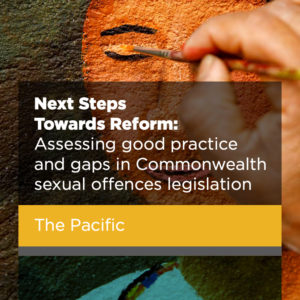The Kiribati sexual offences laws are found in the Penal Code 1977 (PC), as amended by the Penal Code (Amendment) and the Criminal Procedure Code (Amendment) Act 2017 (PCAA). The Cybercrime Act 2021 (CA) also contains some child sexual offences. The Evidence Act 2003 (EA) contains the rules of evidence which apply to sexual assault offences.
The PCAA made some important amendments to the PC, bringing a number of sexual offence provisions in line with good practice standards, including for example introducing a definition of consent as the free and voluntary agreement to sexual activity, criminalising all non-consensual sexual acts involving penetration, not criminalising sexual activity with a person with a disability, and removing derogatory language used towards people with disabilities.
The PCAA made a number of other amendments which improved sexual offence provisions but which do not fully meet good practice standards. For instance, general and child sexual assault provisions were made gender-neutral but some other sexual offences remain limited by gender. The legislation now states that evidence of resistance is not required but does not expressly state that consent cannot be inferred from silence or submission. The child sexual offences in the PC remain incomprehensive and some are undefined, though the passage of the Cybercrime Act in 2021 addresses some of these gaps.
In other respects, the law does not meet good practice standards. It does not expressly criminalise martial rape and sexual assault, ‘indecent assault’ is undefined and does not explicitly cover all acts of non-consensual touching, and the legislation uses moralistic language such as ‘indecent’, ‘defilement’ and ‘immoral purposes’.
Furthermore, the PC criminalises consensual same-sex sexual activity between men and uses derogatory terms such as ‘buggery’, ‘gross indecency’, ‘unnatural offences’ and ‘indecent practices’, while ‘buggery’ is equated with bestiality. Laws that criminalise consensual same-sex sexual activity, such as ‘buggery’ and ‘sodomy’, should be repealed and all non-consensual sexual acts, including anal ‘rape’, should be included in the standard sexual assault provisions, such as ‘rape’ and ‘sexual assault’, as well as in child sexual offences. All of these crimes should be gender-neutral.
Kiribati is a state party to the UN Convention on the Elimination of All Forms of Discrimination against Women, Convention on the Rights of the Child, Convention on the Rights of Persons with Disabilities and Convention against Torture and Other Cruel, Inhuman or Degrading Treatment or Punishment. Kiribati is not a party to the International Covenant on Civil and Political Rights.
Read more about the criminalisation of LGBT people in Kiribati.
The full assessment of Kiribati is available here.



